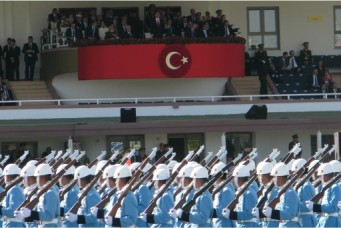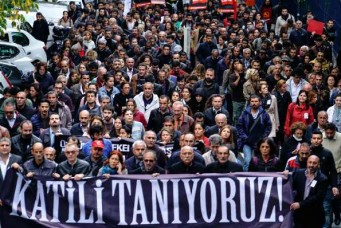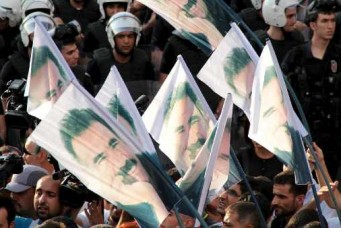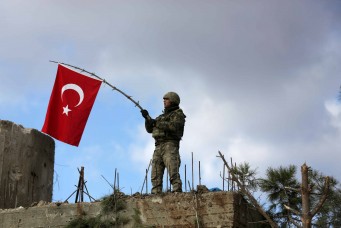Turkey’s Authoritarian Legacy
It’s tempting to blame the country’s recent slide into repression on President Recep Tayyip Erdoğan’s thirst for personal power. But did the ruling Islamist party ever really abandon the country’s long tradition of state authoritarianism?

Turkish President Recep Tayyip Erdoğan, Presidential Palace, Ankara, Oct. 26, 2016. Yasin Bulbul/Anadolu Agency
For years, explaining Turkey’s democratic travails seemed an easy task. There was the persistence of an authoritarian tradition, whose source was identified as Kemalism—the secularist-nationalist founding ideology of the Turkish republic—and which the military embodied. According to the conventional narrative on Turkey, with which anyone who has only casually followed international politics during the last decades will be familiar, the Turkish military had a mission—to “protect secularism”—which explained, so we were taught, its habit of overthrowing governments. All that was needed for Turkish democracy to flourish was the emergence of a force strong enough to end the tutelage of the military.
For several years, the rise of the moderate Islamist Justice and Development Party (AKP) and its leader, Recep Tayyip Erdoğan, seemed to be the answer. The general consensus among international observers was that Erdoğan was on a mission to make Turkey fully democratic. Disappointment and bewilderment have increasingly replaced that hope, particularly after an April referendum engineered by Erdoğan expanded the executive power of the president. There’s a scramble for explanations and definitions that will make sense of and conceptualize Turkey’s authoritarian drift under Erdoğan, the presumed liberal-turned-authoritarian.
The problem at the heart of the matter is that Turkey lends itself all too easily to simplistic dichotomies and to exoticism. The currency of these dichotomies, in turn, reveals an unmistakable, residual orientalism, as in Edward W. Said’s framing. Turkey is, invariably, a place where “East meets West,” where “secularism” and “Westernization” fatefully collide with “Islam.” Western scholarship has long since abandoned the modernization paradigm of the 1950s and 1960s that was applied to the Middle East by orientalists—of whom Bernard Lewis was a leading exponent—and into which Turkey was fitted as a model example of a “modernizing” Muslim country. The judgment of Patrick Kinross, the biographer of Kemal Atatürk, that the founding father of Turkey “dragged his country from the Middle Ages to the twentieth century,” couldn’t sound more anachronistic—and unacceptably orientalist—today. Yet orientalism nonetheless continues to hold sway. Turkish politics is still understood in essentialist terms, within a framework that pits “Western” against “Islamic.”
The only thing that changed when the moderate Islamists came to power was that the role that had traditionally been ascribed to the Turkish actors was reversed: now it was the former Islamists, who had recast themselves as “conservative democrats,” that were assigned the role of the modernizers, while the former heroes of the modernization paradigm, the secularists, were redefined as reactionaries who impeded democratization. In practice, nothing changed.
Alain Rouquié, a French political scientist, advances the definition “hegemonic democracy” to describe regimes like Erdoğan’s Turkey (and Vladimir Putin’s Russia): they are not liberal democracies, because the rights of the minority and the rule of law are not respected; but neither are they dictatorships, because elections are held, and political alternation thus remains possible. Yet, this is increasingly so only in theory. Turkey may not be a dictatorship—elections are held, and President Erdoğan and his party continue to enjoy broad popular support—but the rule of law and freedom of expression remain as elusive as ever.
Last November, Turkish authorities arrested Selahattin Demirtaş and Figen Yüksekdağ, the co-chairmen of the pro-Kurdish and moderately leftist People’s Democratic Party (HDP)—the country’s third-largest party in terms of voters and representation in parliament. Other party lawmakers, as well as the co-mayors of Diyarbakir, the main Kurdish city of Turkey, were also detained. The prosecution called for what would amount to life imprisonment of the leaders of the Kurdish party. Meanwhile, Turkey has come to hold the dishonorable world record for imprisoning journalists, by far distancing China and Iran. They include editors and board members of Cumhuriyet, the oldest daily of Turkey. Journalists are routinely accused of abetting the cause of either the outlawed Kurdistan Workers’ Party (PKK)—the separatist Kurdish organization that has fought an insurgency against the Turkish state since 1984—or the cause of the Muslim cleric Fethullah Gülen, Erdoğan’s erstwhile ally, effectively exiled in Pennsylvania with whom the Turkish president has been locked in a violent power struggle since 2012. The editors of Cumhuriyet stand accused of having supported both PKK and the “Fethullah Gülen terror organization.”
The President and the Cleric
A new narrative is now in fashion, according to which the process of liberalization in Turkey, held to have lasted from 2003 to roughly 2013, was abruptly aborted and authoritarian rule restored, simply because Erdoğan tolerates no dissent. It has become commonplace to blame the authoritarian drift of Turkey on Erdoğan’s thirst for personal power. Murat Belge, a liberal Turkish intellectual who supported Erdoğan for many years, until the crackdown on peaceful protesters in Istanbul and across Turkey in 2013, captured this line of thought when he wrote that “all of the problems that haunt Turkey emanate from the personality and goals of Erdoğan.”
The question of what drives history is an age-old debate. Structural forces, as Karl Marx would have it, or the great heroes and villains, according to Thomas Carlyle? The answer, in the Turkish case, is that both are correct. Erdoğan and his party came to power, carried by class dynamics; but once in power, the personalities and respective ambitions of Erdoğan and of ally-turned-rival Fethullah Gülen have been decisive. The AKP primarily though not exclusively represents the assertive, conservative bourgeoisie of Anatolia that has taken advantage of neoliberal globalization since the end of the 1980s and prospered. It was only to be expected that its economic and social clout was at some point going to be translated into political power. But the AKP’s social base is much wider: the party has also successfully wooed part of the secular bourgeoisie, the conservative lower middle class and the lumpenproletariat as well. Nonetheless, the AKP’s ascent was greeted by Turkish liberals as a “bourgeois revolution” that they expected was going to break the traditional hold of the authoritarian state over society.
These liberals should have reminded themselves, not least since most of them are former Marxists, that Marx had a much less deterministic view of the dynamics of the relationship between the bourgeoisie and state authoritarianism. In The Eighteenth Brumaire of Louis Bonaparte, his classical text on the relationship of state power and class interests, Marx described how the French bourgeoisie came to sacrifice its own immediate political liberties for its long-term economic class interests, bowing as it did before the might of a state—in the person of Louis Bonaparte—that held out the promise of securing these economic interests. Many Turkish intellectuals have indeed lately called attention to what seem to be striking parallels between Erdoğan and Bonaparte. There is a major difference, though, between “Bonapartist” Turkey today and mid-nineteenth century France: no revolutionary upheaval threatens bourgeois interests in Turkey today. The working class is docile and it forms a pillar, in electoral terms, of the regime. The systemic dynamic behind the authoritarian drift lacks any imperative to neutralize a nonexistent class challenge; instead, state authoritarianism is being driven by the power rivalry within the ruling elite between Erdoğan’s AKP and the followers of Gülen and by the challenge posed from the periphery by the Kurdish minority.
In fact, the AKP government never really broke with the tradition of state authoritarianism; it only created the fiction that it had done so. What was vastly more consequential than the limited liberal reforms that were enacted during the first years of the AKP rule—notably curbing some of the powers of the military—was that Erdoğan and his Gülenist allies wreaked havoc inside the ranks of the military. What international observers and liberals in Turkey saw as a period of democratization in fact featured breaches of the rule of law on a massive scale, when hundreds of military officers, as well as similarly innocent civilian opponents of the regime, were imprisoned and convicted on the basis of trumped-up charges and fabricated evidence. The show trials were supervised by Erdoğan, who declared that he was the “prosecutor” of them, while the Gülenists in the police and in the judiciary orchestrated them.
Erdoğan had no choice but to turn to the Gülen movement when he came to power: the AKP lacked the educated cadres, while the Gülenists had already become entrenched in the police and the judiciary. Etyen Mahçupyan, an organic AKP intellectual who briefly served as chief advisor to former Prime Minister Ahmet Davutoğlu, explained Erdoğan’s quandary: “When you come to power, you see that besides you, there are three major forces in the country: the PKK, the military, and the Gülenists. If you antagonize all three at the same time, you will not survive. You must reach an entente with one of them. Thus, there is a period together with the Gülenists, and the peace process with the PKK. And then, as the fight with the Gülenists followed, and the war against PKK restarted, there is a forced entente with the military.”1
Once the common enemy, the old state establishment, was defeated, the Gülen movement and the AKP turned on each other. The first sign of this internecine conflict showed in 2012, when an attempt was made to arrest the chief of the national intelligence service, a close confidant of Erdoğan’s. The then-prime minister made a thinly veiled countermove in the power struggle by announcing his intention to close down dozens of private prep schools that were being run by the Gülen movement. That step precipitated a further round of retaliation from the Gülenists in late 2013, when the judiciary launched an investigation into government corruption. Erdoğan then responded by purging Gülen supporters from the police and the judiciary. And he turned to the military as a new ally, releasing in 2014 all the imprisoned officers who he now admitted had been wrongly accused of coup plotting.
However, the military was no longer the same. Starting in 2003, the AKP government had regularly blocked the high command’s requests to discharge officers suspected of Islamist ties. Meanwhile, the mass imprisonment of “Kemalist” officers had depleted the military’s upper ranks, and made it possible for younger officers to rise further and faster than ever. The Gülenist clout within the military appeared considerable, and Erdoğan had to hope that the top brass, to whom he now appealed, would succeed in keeping Gülenists among the lower ranks in check.2 The high command nearly failed to do so. Even though many details of the July 15, 2016 coup attempt remain unknown, it is very likely that officers loyal to Gülen played a decisive role. The notion that the coup was the work of a Gülenist faction is not far-fetched, since the attempted putsch occurred in the context of entrenched Gülenist influence within Turkey’s institutions of state and a years-long power struggle between Erdoğan and Gülen.
Strong Men
Erdoğan accepts no limits to his power, and the constitutional amendments approved in the April 16 referendum institutionalize the executive presidency that was effectively in place. Erdoğan was never known to be a team player; early on, he acquired the sobriquet “reis,” the leader. As a young, upcoming politician in the Islamist Welfare Party in the late 1980s and early 1990s, he famously defied Necmettin Erbakan, the legendary leader of the Turkish Islamist movement. So it comes as no surprise that he has worked to monopolize power into his own hands. Yet his authoritarianism is ultimately defensive in its character; as Etyen Mahçupyan points out, his hold on state power has always been tenuous, forcing Erdoğan to rely on others—the Gülenists, the military—in order to survive politically. And Gülen is no less responsible than Erdoğan for Turkey’s descent back into authoritarianism; indeed, it is not at all likely that a more democratic Turkey would have emerged had Gülen’s power grab succeeded. The opposite is more probable.
Officially, the Gülen movement is committed to values of religious moderation and interfaith dialogue; it promotes education and science through its extensive network of international schools. Yet the Gülenists also, and more importantly, form a secretive network that has ruthlessly sought to wield power, in glaring contradiction of the moderation that the movement’s officials preach. Tellingly, journalists that reported on their power grab during the early years of the AKP’s rule were imprisoned for years. The fact that Erdoğan jealously protected his power prerogatives, and refused to cave in when the Gülenists asked for a bigger share of political and state power, may in fact have saved Turkey from a much more sinister authoritarian regime. Turkey today would have been a different country— although not necessarily more democratic—if it hadn’t been for the role that Erdoğan has played. Nonetheless this should not obscure that what are seen to be expressions of his personal power greed are also in tune with Turkish political logic in the longue durée. Erdoğan is not the progenitor of the idea of an executive presidency—it has a long pedigree in the successive leaders of the right in Turkey that favored it since the 1970s. The first to propose an executive presidency was the leader of the far right in the 1970s, Alparslan Türkeş. The idea holds a natural appeal to conservatives and to the far right, both inclined to favor the rule of a strong man that embodies a strong state endowed with the mission to preserve the integrity of the Turkish nation.
It seemed reassuring enough when the former Islamists of Turkey presented themselves as “conservative democrats”—this was undeniably a semantic improvement that also appeared qualitatively promising, as the Islamists had been antidemocratic, and now embraced democracy, albeit in its “conservative” version. However, in the Turkish political context conservatism is not a democratically reassuring definition. Framing Turkish politics in the distorting terms of the Kemalist–Islamist dichotomy has meant, though, that conservatism has escaped scrutiny. Tanıl Bora, a Turkish liberal intellectual—and the author of a new, acclaimed history of political thinking in Turkey since the closing days of the Ottoman Empire—observes that the single-minded focus of the liberal Turkish intellectuals during the last decades on critically scrutinizing Kemalism and its authoritarian legacy, although legitimate in itself, has offered nationalist-conservatism, and generally the antidemocratic right and its authoritarianism, a free pass.3
Yet, this is remarkable. After all, it is conservatives that have ruled Turkey without interruption, except for a few years in the 1970s when a social democrat headed the government. And on those occasions that the military has stepped in, it has done so only in order to implement the rightist authoritarian policies that the governments of the civilian right had proved unable to execute, and not to promote any “Enlightenment values,” as the long-lived myth about the Kemalist praetorian guard of Turkey maintains. Atatürk himself was a radical secularist, even though it didn’t mean that he was also “enlightened,” but his rightist successors, generals and civilians alike, have been neither secularists nor democrats.
When what has passed for “Kemalism” has been used as a tool to shore up state power, as it was during the rule of the military junta in the 1980s, it has equaled authoritarian, nationalist-conservatism, with a strong dose of Sunni Islam. The true state ideology of Turkey since the 1940s has been a “Turkish-Islamic synthesis,” a term that was put in official use during the military rule in the 1980s. In this respect, the current Turkish regime represents continuity. Above all, Kemalism is a supremely distorting concept that prevents making sense of modern Turkish history; it needs to be replaced with the more pertinent term “conservatism” if this history is ever to be rendered intelligible.
Turkish conservatives have a history of advocating authoritarian rule. From the 1960s onward, they consistently called for and worked for restricting political freedoms and liberties. The rightist leader Süleyman Demirel, Turkey’s long-serving prime minister and finally president from 1993 to 2000, in the 1970s led the Nationalist Front, the rightist, antidemocratic alliance composed of conservatives, the far right, and Islamists that subverted Turkish democracy and prepared the ground for the right wing military coup in 1980. The Front, supported by big business and assisted by the right wing networks in the state, the infamous “deep state” of Turkey, led the charge against the rising social democracy and against a constitutional order deemed too liberal, as it allowed the left to organize and accorded rights to the trade unions. Today, the Nationalist Front of the 1970s has been resurrected, with the same mission as the last time: to impose a straightjacket on democratic politics and ramp up authoritarian state power. The far right Nationalist Action Party (MHP), with its leader Devlet Bahçeli, joined hands with the AKP and Erdoğan in pushing for the April 16 constitutional amendments that render parliament powerless.
Fissures and Fascism
Historically in Turkey, moves to amend constitutions deemed to be too liberal and to ramp up authoritarian state power have coincided with the rise of emancipation movements, be they social or ethnic. The recent rise of the pro-Kurdish and mildly leftist HDP in many ways parallels the rise of the left in the 1960s and 1970s and it has triggered similar reactions: the formation of a nationalist-conservative alliance and authoritarian-minded constitutional amendments. In the 1970s, the right called for a version of presidential strongman rule to protect the state against “communist subversion”; today, the leader of the far right, Erdoğan’s ally Bahçeli, is similarly arguing that the introduction of a presidential system is in the interest of the state, and that this system will ensure that the aspirations of the Kurds are checked. Indeed, while the parliamentarian system allows the Kurdish political movement to potentially wield power, to make use of that power to advance its claims for local autonomy—as has been noted, the pro-Kurdish HDP is the third-largest party in the Turkish parliament—it can of course never hope to win the presidency. The introduction of an executive presidency that makes parliament irrelevant is thus fundamentally in accordance with raison d’état, and not the simple expression of Erdoğan’s “power hunger.”
The need to ramp up state authority has partly arisen in response to the fact that the constitutional order that the military junta put in place in the early 1980s has at the end of the day proved ineffective in shielding the established order from upsets from below. The 1982 constitution introduced a 10 percent threshold to parliament, which was designed to block the Kurdish minority from gaining representation, but in the general election in June 2015, the pro-Kurdish HDP broke through the barrier. The push for concentrating all executive power to the presidency is also intended to remedy the institutional breakdown of the Turkish state apparatus. The fracturing of the state into rival, warring factions, which culminated with the attempted coup in 2016, has become another argument in favor of shoring up state authority.
Perry Anderson, a British Marxist historian, has observed that, “Turkey could become a democracy so much earlier than Spain, a more advanced society—let alone other countries as economically and socially backward in the 1950s—because there was no comparably explosive class conflict to be contained, no radical politics to be crushed. Most peasants owned land, workers were few, intellectuals marginal, a left hardly figured. In these conditions, there was limited risk of any upsets from below. The elites could settle accounts between themselves without fear of letting loose forces they could not control.”4 But, as Anderson notes, that degree of security would not last. Class fissures, absent in 1950 when Turkey became a multiparty democracy, would surface in the 1960s with the emergence of a working class. That triggered calls for authoritarian rule from conservatives and from the far right. The buried ethnic fissures that did exist would start to crack open and threaten the established order from the mid-1980s and onward.
Turkey was able to return to democratic governance a few years after the 1980 coup because the class conflict that had erupted in the 1960s and 1970s was successfully contained. The oppression of the left by the military junta created a vacuum that was filled by Islamism, which was helped along by the policies and ideological discourse of the military. Kenan Evren, the general who took power in 1980, warned that it would be “unthinkable” for Turkey to become irreligious. “We must firmly embrace our religion,” he declared in 1981.
In the absence of the left, the claims of the popular classes were channeled, first to the Islamist Welfare Party, and later to the AKP, its successor. Cihan Tuğal, a Turkish academic, has used Antonio Gramsci’s concept of “passive revolution” to describe how the popular challenge to capitalism in Turkey was absorbed and neutralized by Islamism. The fact that the Islamists had replaced the left as the voice of the people helped maintain a parliamentary system, as the passive revolution that they accomplished during the 1980s and 1990s ensured that the popular classes—workers and peasants—did not rise to challenge the established order as they had done in the 1970s, when they had rallied to the social democratic left.
Islamic conservatism has proved to be much less successful in containing the ethnic conflict. To once again paraphrase Anderson, Turkey cannot remain a parliamentary democracy because there is an explosive ethnic conflict to be contained. Since the 10 percent threshold to parliament no longer offers any guarantee that Kurdish parties will be denied national political representation and power, the only recourse left for the guardians of established order—the nationalist-conservatives—is to replace parliamentarian rule with an all-powerful presidency.
Can social democrats save Turkish democracy? HDP co-chairman Demirtaş last year made a plea for the formation of a “democratic bloc” that would stand up against the ruling “fascist bloc.” A few days before he was arrested, the Kurdish leader—who received nearly 10 percent of the votes in the presidential election in 2014—asked, “Why should it be impossible for those who call for equality and brotherhood to get 60 percent of the votes? Why can’t we come together and form a democratic bloc? Are we condemned to a fascist bloc?” Demirtaş was addressing the main opposition party, the Republican People’s Party (CHP), which has showed no interest in forming such a leftist democratic alliance, even though it calls itself social democratic.
Quite the opposite: the CHP, which is the founding party of Turkey, and is beholden to Turkish nationalism, played a decisive role in paving the way for the arrests of the HDP lawmakers. When the Turkish parliament in May 2016 voted to abolish the immunity of the lawmakers, CHP leader Kemal Kılıçdaroğlu instructed his party group to vote for the joint proposal of the AKP–MHP alliance, knowing very well what the next step would be. Not all CHP lawmakers followed his instruction, but critically, enough of them did. The HDP has also found it difficult to transcend nationalism; even though the party has made an attempt to reach out to a broad electorate, it has nonetheless remained just as beholden to Kurdish nationalism as CHP is to Turkish nationalism. In the absence of a broad, democratic left, Turkey does seem condemned to being ruled by some version of the same old authoritarian right as always.
1 Talk with the author, Istanbul, June 2015
2 “Erdoğan Loses It,” Foreign Affairs, February 9, 2014
3 “Tanıl Bora: “Olağanüstü dayanıklı saydığınız o ‘kodlar’ da değişir…”,” Oggito, February 8, 2017
4 “After Kemal,” Perry Anderson, London Review of Books, September 25, 2008
Halil Karaveli is senior fellow in the Silk Road Studies Program of the Central Asia- Caucasus Institute where he heads the Turkey Initiative and is editor of Turkey Analyst. From 1991 to 2007, he was an editorial writer at Östgöta Correspondenten, a Swedish daily. He has contributed to the New York Times, Foreign Affairs, and National Interest.
Subscribe to Our Newsletter





